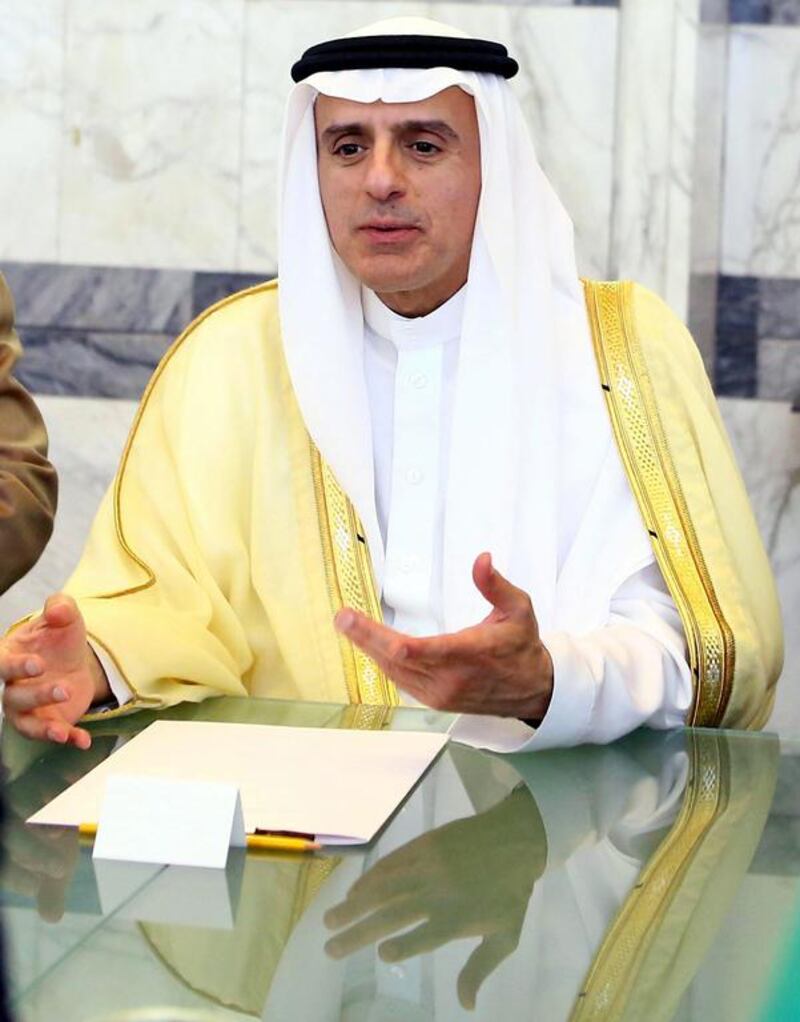ABU DHABI // Saudi Arabian foreign minister Adel Al Jubeir will visit Moscow this week to discuss the conflict in Syria with his Russian counterpart.
The meeting between Mr Al Jubeir and Sergei Lavrov, scheduled for Tuesday, was announced by Russia’s foreign ministry following a flurry of diplomatic activity that regional observers believe could be a fresh push to end the Syrian war.
“The ministers will discuss the possibility of Russia-Saudi cooperation in fighting terrorism, which is in the interests of both countries,” the Russian foreign ministry said on Saturday.
A Russian proposal to create a “broad international coalition” to fight ISIL in Syria will also be discussed. Saudi Arabia is currently taking part in a US-led coalition that is bombing ISIL in Syria and Iraq that Russia has not joined, though Moscow has said it supports efforts to defeat the extremist group.
In June, Saudi Arabia’s deputy crown prince and defence minister Mohammed bin Salman met Russian president Vladimir Putin in an effort to improve relations between the countries. Riyadh supports rebels seeking to overthrow the Assad regime while Moscow has steadfastedly supported Damascus. Analysts were hopeful the meeting signalled that the countries might be changing their approach to the region.
“Although the two countries still see the conflict in Syria through different lenses – with Russia continuing to see Assad as part of the solution while the Saudis see him as the main problem – it does appear that the Saudis have concluded that Russia may hold the key to bringing the bloodshed in Syria to an end,” said Fahad Nazer, an analyst at Virginia-based consultancy JTG Inc who used to work at the Saudi embassy in Washington.
“Saudi Arabia’s persistence in this effort also suggests that Putin’s commitment to Assad may not be as ironclad as many assume.”
While efforts to find a diplomatic solution to the Syrian conflict have been unsuccessful for years, Mr Al Jubeir’s visit carries special significance because of the influence Saudi Arabia and other Gulf Cooperation Council countries have over rebels fighting the Assad regime.
The regional atmosphere is also vastly different from when other talks took place. On July 14, Iran, the main backer of Mr Al Assad, reached a deal with world powers over its nuclear programme.
The accord – which is being trumpeted by supporters as a victory for diplomacy – sets the ground for Iran to rejoin the international community after debilitating sanctions are lifted in return for Tehran scaling back its nuclear enrichment programme.
Russia, which has maintained close relations with Tehran, was reported to have played a key role in reaching the deal.
Following the signing of the accord, Syrian foreign minister Walid Al Moallem, was in Tehran last week for talks with Russian and Iranian officials about ending the conflict.
“Fortunately we see a change in the strategy of regional players in the Syrian crisis. If four years ago they believed war is the only solution, now they prefer to focus on diplomacy,” said Iran’s deputy foreign minister, Hossein Amir Abdollahian, according to Fars News Agency.
At nearly the same time, US secretary of state John Kerry was in Doha meeting with GCC foreign ministers about the Iran deal. He also met separately with Mr Lavrov and Mr Al Jubeir over the Syris crisis.
Following his talks in Tehran, Mr Al Moallem flew to Oman, the country that helped US and Iranian officials begin talks that led to the signing of the nuclear deal. The trip was Mr Al Moallem’s first trip to a GCC country since the uprising against the Assad regime started in 2011 and was the clearest sign yet that the new efforts to end the conflict are serious.
During their meeting in Moscow, Mr Al Jubeir and Mr Lavrov will also discuss a resolution to the conflict in Yemen where Saudi Arabia is leading a coalition of countries in a campaign against Iranian-backed Houthi rebels.
jvela@thenational.ae
* With additional reporting from Agence France-Presse





